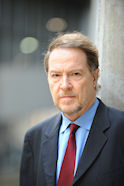By Lindsey Minerva
 Looking at the photo of 5-year-old Abner and his violin, you might think, “How cute!”
Looking at the photo of 5-year-old Abner and his violin, you might think, “How cute!”
But don’t let his gap-toothed smile fool you. Abner is what you might call a child prodigy.
Before he could read or write, Abner could play the violin. He picked it up when he was 3, and from that day on, practicing for an hour a day wasn’t a chore — it was a joy.
“Abner practices one hour every day, and he doesn’t think about the time,” says his mother, Angela Patzan.
Abner was given the opportunity to take on his passion, thanks to World Vision’s Children Artistic Development Center in central Guatemala. Abner is one of about 200 children from age 3 to 25 who are offered a wide range of areas to study: choir, string instruments, and youth symphony orchestra.
Children here are taught through the Suzuki method — the idea that talent isn’t inherent, but every child has the potential to develop it.
Abner certainly has. Now, instead of watching cartoons, he listens to classical music and practices his violin with his stuffed animals set up as an audience. “I like music; Allegro is my favorite music piece, because it’s cheerful!” Abner says.
While Abner is happy to play, his mother recognizes how the music program has enriched the entire community. “Now, people know our community, our children are growing with values, and they are going to have a better future,” she says.
Abner proudly plays his violin at World Vision’s Children Artistic Development Center in Guatemala.
Investing in children is particularly significant in Abner’s neighborhood, where the center is located. It is one of the most violent in Guatemala. Youth are faced with the reality of gangs, teen pregnancy, and a lack of education.
My hope for Abner and the other students involved at the creative arts center is that music will instill in them hope and a sense of belonging — and they won’t feel a need to seek these things from gangs or other negative relationships. I have seen God use music as a source of encouragement in my life, and I pray that they will experience the same.
Growing up, my family didn’t have lot of extra money. We were blessed with food on our plates and a roof over our head. But things like dance lessons, new clothes, and cable for our television didn’t fit into our budget.
But church choir was free. Each week, I looked forward to Tuesday nights, when I would sing alongside my friends from Sunday school. It didn’t matter that I didn’t have what other kids did — music made me feel like I belonged.
My dad, a musician, took every opportunity enjoy music with us. Many nights were spent with him playing his guitar while my sister and I danced and sang along. To my little girl heart, there was no greater joy.
There has always been a sense of comfort that comes with music. The world feels a little bit lighter with a good song in my head. As a little girl, it connected me to my church and my family. Music helped me feel like I belonged, and it filled me with joy.
When Abner’s family is gathered together, they all ask him to play his violin. Abner’s family recognizes his talent — they believe in him.
They say, “Here he comes, the violinist!” And his heart, too, is filled with joy and a sense of belonging.
Lindsey Minerva is Managing Editor of the World Vision blog, where this post was originally published. Alice Contreras of World Vision Guatemala also contributed to this post.


 We elevate the events of the American Revolution to near-mythical status all too often and forget that the real revolutionaries were people just like you and me. Caught up in the drama of Red Coats marching, muskets exploding and flags waving in the night, we lose sight of the enduring significance of the Revolution and what makes it relevant to our world today. Those revolutionaries, by and large, were neither agitators nor hotheads. They were not looking for trouble or trying to start a fight. Like many today, they were simply trying to make it from one day to another, a task that was increasingly difficult as Britain’s rule became more and more oppressive.
We elevate the events of the American Revolution to near-mythical status all too often and forget that the real revolutionaries were people just like you and me. Caught up in the drama of Red Coats marching, muskets exploding and flags waving in the night, we lose sight of the enduring significance of the Revolution and what makes it relevant to our world today. Those revolutionaries, by and large, were neither agitators nor hotheads. They were not looking for trouble or trying to start a fight. Like many today, they were simply trying to make it from one day to another, a task that was increasingly difficult as Britain’s rule became more and more oppressive.